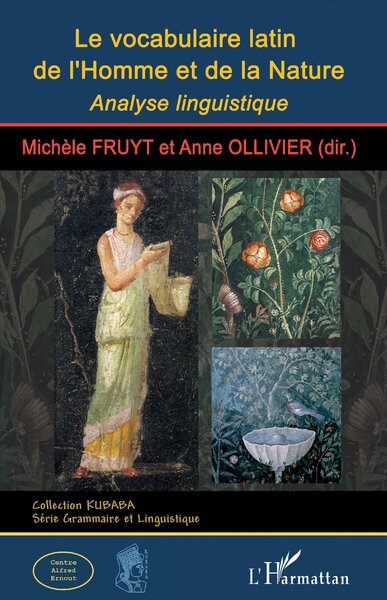Le vocabulaire latin de l’Homme et de la Nature - Analyse linguistique
Editeur(s) L'HARMATTAN
Collection(s) Kubaba
Rayon(s) Linguistique, Sciences du langage, Lettres et Sciences du langage, SCIENCES HUMAINES ET SOCIALES, LETTRES
Ean :
9782336505688
Date de parution :
03/04/2025
Résumé : 31 termes latins essentiels pour la langue latine et la société romaine sont ici analysés selon tous leurs aspects linguistiques du latin archaïque jusqu’aux langues romanes. Ils sont regroupés en trois parties selon leurs domaines :
•Être humain : femina « femelle, femme », erus « maître de maison », pax « paix », nouus, recens « nouveau », barba « barbe », caluus « chauve », somnus « sommeil », terrere « effrayer », arma « armes », follis « soufflet », malleus « maillet ».
•Nature : hortus « jardin », arbor « arbre », flos « fleur », uiola « fleur idéale », alica « semoule de blé », farina « farine », hibernus « d’hiver », porcus, sus « porc, cochon », aper « sanglier ».
•Matière : plenus « plein », celeber « très fréquenté », crassus « épais », grossus « gros », lentus « mou », tardus « lent », flauus « blond », florus « brillant ».
We analyze here in all their linguistic aspects, 31 Latin terms that are fundamental to the Latin language and to Roman society. Each is studied from the Early Latin period through to the Romance languages. They are grouped into three main sections according to whether they relate primarily to:
•Human beings: femina“female, woman”, erus“master of the house”, pax“peace”, nouus, recens“new”, barba “beard”, caluus “bald”, somnus“sleep”, terrere“terrify”, arma“arms”, follis“bellows”, malleus “mallet”.
•Nature: hortus“garden”, arbor“tree”, flos“flower”, uiola“ideal flower”, alica“wheat semolina”, farina “flour”, hibernus “of winter”, porcus, sus“pig”, aper “wild boar”.
•Matter: plenus“full”, celeber “frequented”, crassus“thick”, grossus“fat”, lentus“soft”, tardus “slow”, flauus “fair”, florus“bright”.
•Être humain : femina « femelle, femme », erus « maître de maison », pax « paix », nouus, recens « nouveau », barba « barbe », caluus « chauve », somnus « sommeil », terrere « effrayer », arma « armes », follis « soufflet », malleus « maillet ».
•Nature : hortus « jardin », arbor « arbre », flos « fleur », uiola « fleur idéale », alica « semoule de blé », farina « farine », hibernus « d’hiver », porcus, sus « porc, cochon », aper « sanglier ».
•Matière : plenus « plein », celeber « très fréquenté », crassus « épais », grossus « gros », lentus « mou », tardus « lent », flauus « blond », florus « brillant ».
We analyze here in all their linguistic aspects, 31 Latin terms that are fundamental to the Latin language and to Roman society. Each is studied from the Early Latin period through to the Romance languages. They are grouped into three main sections according to whether they relate primarily to:
•Human beings: femina“female, woman”, erus“master of the house”, pax“peace”, nouus, recens“new”, barba “beard”, caluus “bald”, somnus“sleep”, terrere“terrify”, arma“arms”, follis“bellows”, malleus “mallet”.
•Nature: hortus“garden”, arbor“tree”, flos“flower”, uiola“ideal flower”, alica“wheat semolina”, farina “flour”, hibernus “of winter”, porcus, sus“pig”, aper “wild boar”.
•Matter: plenus“full”, celeber “frequented”, crassus“thick”, grossus“fat”, lentus“soft”, tardus “slow”, flauus “fair”, florus“bright”.
Disponible, expédié sous 2 à 6 jours
48,00 €

